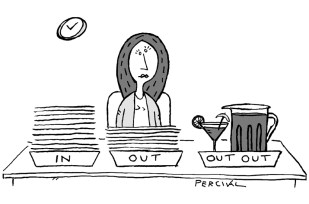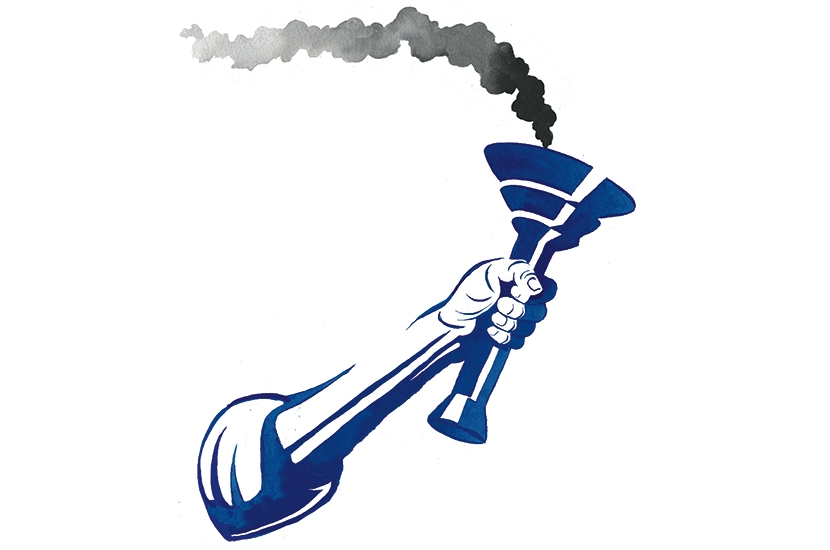It was a luminous late August sunset, and we were in France, dining outdoors with some friends who have a magical, charming place in the countryside there. We were discussing audiobooks of the kind you could listen to on a long car journey and I mentioned how Julian, my partner, and I had enjoyed my Times colleague David Aaronovitch’s memoir of childhood and youth, Party Animals: My Family and Other Communists.
If you haven’t read it, do. David’s family were hardline members of the British Communist party. He was brought up to believe that ‘God Save the Queen’ was an anthem of imperialist oppression, and the revolution, hopefully peaceful, was perhaps just around the corner. The family holidayed in Bulgaria, had high hopes for the Soviet Union, and spent their leisure time in London at party meetings, distributing leaflets and banging the drum for the ideology in which they placed all their faith.
There was nothing clandestine about this. The Aaronovitches were not sinister or malevolent people, just a family seized with a hopeless conviction, and at first David never questioned it. Later he did. He has ended up pretty close to the ideological centre in our politics, and is a champion of the freedom of thought and speech that his erstwhile fellow activists would have regarded as a product of liberal false consciousness. But his book is full of kindness and sympathy — and a measure of bafflement — towards the misplaced faith of a political grouping who were almost a tribe. How could they possibly have believed such things?
Describing the book, Julian said he didn’t suppose it had sold particularly well, because who these days, apart from a few recalcitrant Corbynites, is interested in a washed-up dogma that proved a dead end in modern history? How different (I thought) from people like my friends and me, liberal conservatives fighting the good fight against Brexit, little Englanders and vulgar populism. We’re in the mainstream, our battles and our ideas still alive and kicking.

Or are we?
France had been the second part of our holiday. The first had been spent in Spain, where we’d visited the family and widow of our dear departed friend Tristan (Lord) Garel-Jones, one of John Major’s best and most dedicated ministers. A whip during the Maastricht treaty negotiations, later Europe minister, Tristan was a Conservative of the thoughtful, liberal sort, and an ardent if critical believer in Britain’s place within the European Union. He was a great Englishman (well, Welshman) and I miss him terribly.
How sad for him, I’ve thought, that over his last years was cast the shadow of the 2016 vote to leave the EU. Still he knew, I hope, when he died, that the battle continued. Did he? Does it?
Maybe the right-of-centre will be dominated by populists for the rest of my life?
For a little group of us it had been, for many years, an annual fixture and a highlight of the late summer to spend a long weekend with the Garel-Joneses on their lovely little estate in the foothills of the Gredos mountains (Tristan’s widow is Spanish) and to sip wine (though Tristan was a teetotaller) and pass cool evenings talking about British politics past, present and future. Among us the flame of intelligent, liberal, internationalist conservatism burned bright.
But he is gone. And it was to such thoughts that my mind now tended in France as we discussed David Aaronovitch’s family’s small, almost closed world of ardent communism, chuckling in a kindly way about the misfortune of getting your life all tangled up in a doomed political cause. Could that apply to me and my friends too: my old friends at Tristan’s place, my old friends in their place in France? The awful thought would not leave me, and has not left me since.
How many fiercely, steadfastly held political creeds, once in the mainstream, once with a dog in history’s fight, have ended up beached, as the tide of living ideas and modern argument turns back and leaves them?
Every tide leaves its calling card: little clumps of seaweed, the remnants of a sand-castle, the occasional jellyfish. After the 1917 revolution in Russia, the so-called White Russians — a ragbag of nostalgic tsarists, liberals and former warlords, united by opposition to the Bolsheviks — lingered on, still agitating, waiting for their day to come. In the South Africa where I was born in 1949, liberalism and multi-racialism were still a force for decades after the Afrikaner nationalists had come to power in 1948; and the old, more moderate United party fought on, a little weaker every year. There will have been moments in the 20th century when British communists might have seemed to have a fighting chance of gaining ground — yet long after it was clear they hadn’t, clumps of the faithful, beached, could still be found.
What right have I to any confidence that liberal conservatism in Britain faces any different future? The centre left (I reckon) will probably enjoy a resurgence, the far left probably not. But maybe the right-of-centre will be dominated by populists for the rest of my life? Are my political friends and I destined to continue visiting each other’s houses and holiday homes, keeping the flame alive, but every summer a year older, raising glasses of full-bodied wine to thinning hopes that the age of reason has not departed, but is just resting a while?
Let’s face it: for the moment the force is no longer with us. Yes, Sir Ed Davey is a less than thrilling figure; yes, the Independent Group, later (was it?) ‘Change UK’, was hopelessly overconfident and something of a salon des refusés. Yes, the 21 Tory MPs, noble souls, who lost the Conservative whip last year hardly amounted to a hard-edged political grouping … but if the tinder for a liberal flame had been dry, such sparks might have been able to ignite it. Not a flicker though, or not yet.
We almost thought we were forerunners. Now I almost feel we’re remnants. When does a forerunner become a remnant, and how does it know? Perhaps David’s parents could have told us, but I doubt it.







Comments